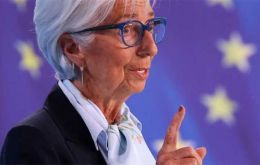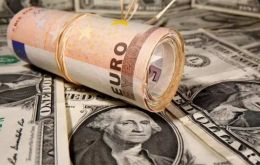MercoPress. South Atlantic News Agency
Tag: European Central Bank (ECB)
-
Friday, February 20th 2026 - 03:43 UTC
Christine Lagarde: International order is “in danger”

European Central Bank (ECB) president Christine Lagarde warned on Thursday in New York that the international order is “in danger” because the United States has begun to doubt the rules-based system it long supported, in remarks delivered as she received Columbia University’s Wolfgang Friedmann Memorial Award.
-
Monday, July 22nd 2024 - 11:37 UTC
European Central Bank leaves rate unchanged, waiting for September data

The European Central Bank (ECB) left its main interest rate unchanged at 3.75%, but president Christine Lagarde indicated that an interest rate cut is possible at its next meeting in September. However in her media conference following last Thursday announcement warned that risks to growth persist.
-
Monday, June 10th 2024 - 07:07 UTC
Christine Lagarde: Why we adjusted interest rates

By Christine Lagarde
The ECB has cut interest rates, 6th June. President Christine Lagarde explains why and sets out what still needs to be done to bring inflation back to 2% over the medium term. (*) -
Friday, April 12th 2024 - 15:40 UTC
European Central bank keeps high interest rates unchanged; US surprised by rising inflation in March

In a week in which the United States was surprised by an increase in inflation further delaying prospects of a soon cut in the Federal Reserve's rate cut, the European Central Bank held interest rates at a record high, although as usual signaling it could cut interest rates at its next meeting in June.
-
Tuesday, October 31st 2023 - 09:03 UTC
ECB leaves interest rates unchanged for the first time since July 2022

The European Central Bank, ECB left interests rates unchanged for the first time in more than a year at a meeting in Athens last Thursday. ECB said it would leave key rates unchanged at between 4 and 4.75%.
-
Friday, March 17th 2023 - 07:53 UTC
“Euro area banking sector is resilient, with strong capital and liquidity positions”, ECB President Lagarde

Anticipating the Euro area banking sector is resilient, with strong capital and liquidity positions, and that inflation is projected to remain too high for too long, the European Central Bank announced on Thursday that the ECB Governing Council decided to increase the three key ECB interest rates by 50 basis points, in line with its determination to ensure the timely return of inflation to the 2% medium-term target.
-
Thursday, September 22nd 2022 - 10:12 UTC
With Fed help and warmonger Putin, Super Dollar is stronger than the Euro

The European Union common currency, the Euro sank to a two-decade low of US$0.9810 on Thursday. It came after Russian President Vladimir Putin ordered the partial mobilization of reservists in an escalation of the war in Ukraine and after the Federal Reserve implemented a 75 basis points increase to the interest rate.
-
Friday, July 22nd 2022 - 09:30 UTC
European Central Bank raises benchmark interests, first time in eight years

The European Central Bank on Thursday raised key interest rates for the first time in over a decade with the purpose of combating inflation, reflected in consumer prices of the Euro-zone which reached 8,6% in the first half of the year.
-
Thursday, July 14th 2022 - 09:10 UTC
Ukraine war: Euro cheaper than the US dollar for the first time in two decades

As Ukraine war continues and fears that Russia could further restrict Europe's supplies of gas, increasing the chances of a recession in the Eurozone, the European common currency has fallen below the dollar for the first time in nearly 20 years.
-
Friday, April 15th 2022 - 09:44 UTC
European central bank will raise interest rates after ending assets' purchasing program

The European Central Bank Governing Council said on Thursday that in the current conditions of high uncertainty it will maintain “gradualism and flexibility” as the guidelines for its monetary policy anticipating that the assets purchase program will be concluded by the third quarter.
